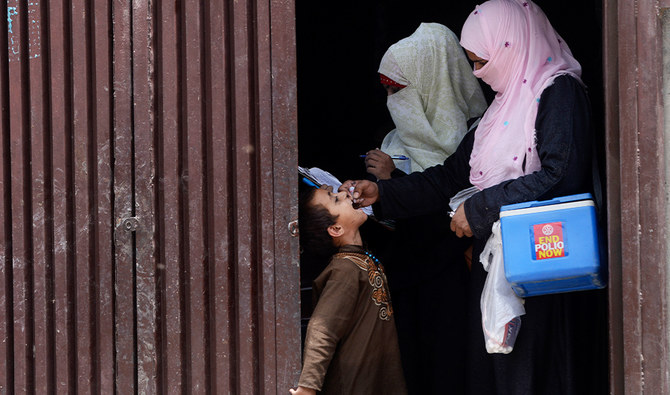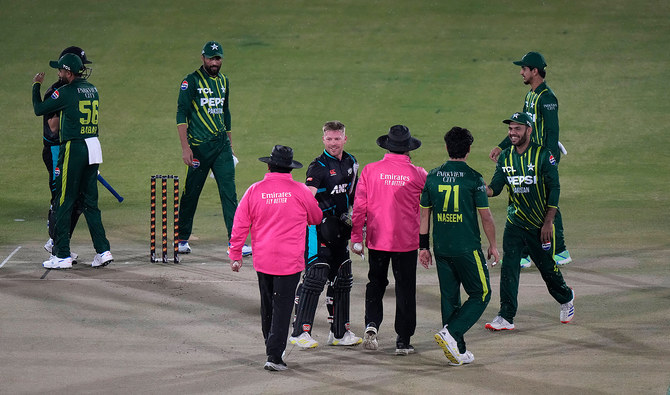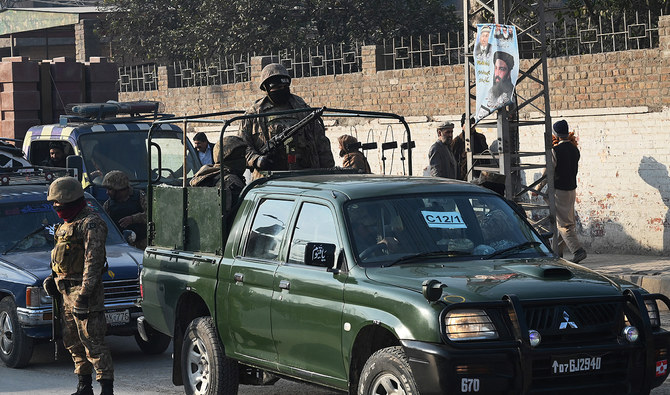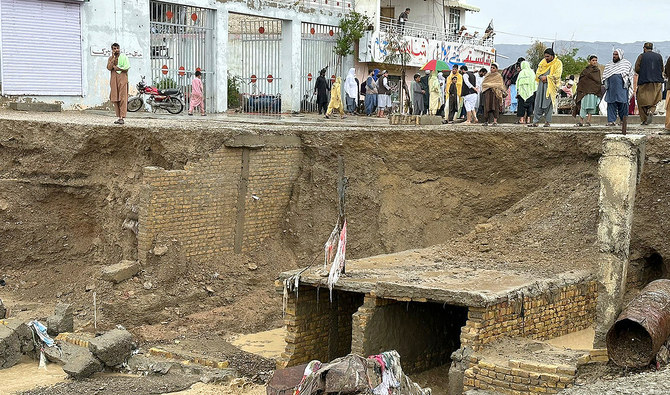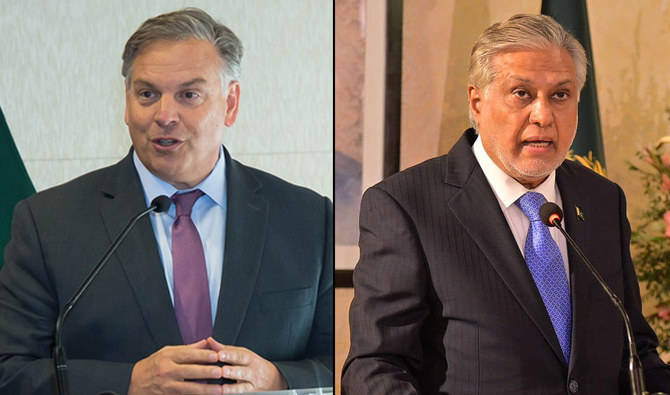PESHAWAR/ LAHORE: Kaleemullah Khan, a healthcare worker in Pakistan’s northwestern city of Peshawar, has spent the last week in fear. Every morning, he checks his temperature for fever and then monitors himself for signs of the flu.
The 37-year-old’s paranoia is not unfounded. A day before Eid holidays, Khan had to check up on a man in his area who had tested positive for the deadly coronavirus.
“He had all the symptoms of the virus,” the health care worker told Arab News. “Symptoms can take up to 14 days to appear in an infected person. So I am very scared. Seven more days till I am safe.”

Kaleemullah Khan, a healthcare worker in Pakistan’s northern city of Peshawar, marks shops and mosques in his area to ensure people follow social distancing rules on May 30, 2020. (Photo courtesy: Kaleemullah Khan)
For Khan, being on the front lines of fighting a major healthcare emergency is nothing new. For eight years, he has been working for the government in Khyber Pakhtunkhwa province to eradicate the wild poliovirus.
But this new disease it different. It is more intimidating.
“For polio, we would go to people’s homes to talk to them, give drops, organize seminars in small rooms,” Khan said. “We did all this without fear because we knew we would not get the virus.”
“Now you just don’t know.”
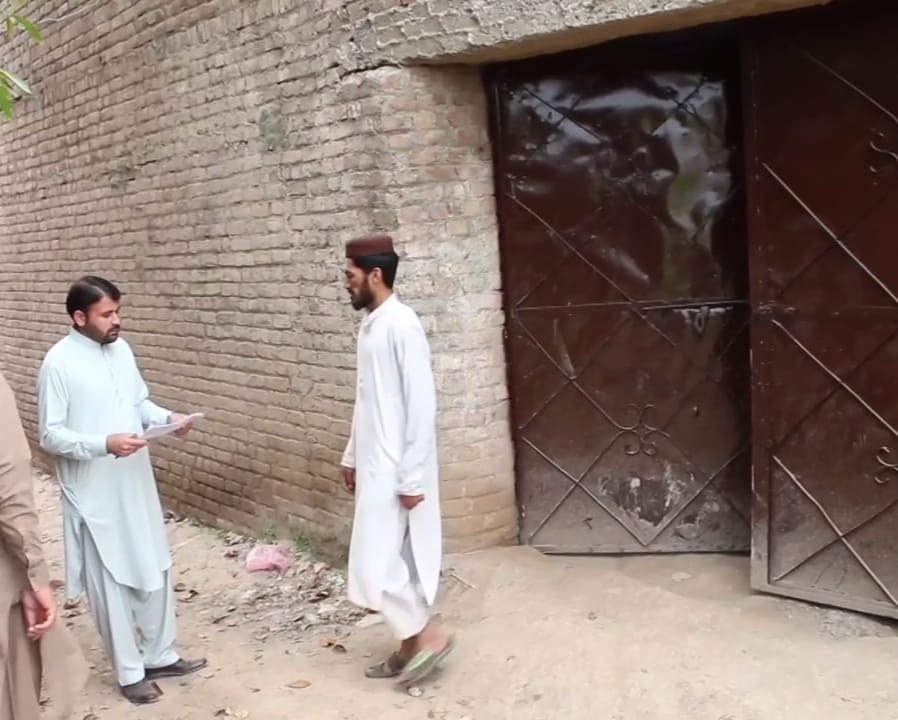
Kaleemullah Khan, a healthcare worker in Pakistan’s northern city of Peshawar, marks shops and mosques in his area to ensure people follow social distancing rules on May 30, 2020. (Photo courtesy: Kaleemullah Khan)
Khan lives with his wife, two small daughters and his old parents. He says he is always worried about bringing the virus home.
Till March 22, the father of two was preforming his routine duties of administering anti-polio drops to young children. Then suddenly the polio program was put on hold and Khan and other health care workers were reassigned to fight a new virus– COVID-19.
Since polio is still endemic in Afghanistan and Pakistan, the only two countries in the world where the disease has not been eliminated, the national polio program had footprints in even smaller administrative units of the country. That is why state officials turned to the polio staff to help track down coronavirus carriers.
Khan’s job now entails tracing people who have arrived in the province from other countries, checking them for symptoms, spreading awareness about safety protocols and reporting on those who violate the government’s lockdown rules.

Kaleemullah Khan, a healthcare worker in Pakistan’s northern city of Peshawar, marks shops and mosques in his area to ensure people follow social distancing rules on May 30, 2020. (Photo courtesy: Kaleemullah Khan)
He completes his daily 12-hour shift with only a face mask, gloves and a hand sanitizer to protect him.
“People in our culture, they always want to hug or shake hands to greet you,” he says, “It difficult to maintain a distance here.”
In March, the government prepared national guidelines on COVID-19 and PPEs (personal protection equipment) for the rational utilization of hazmat suits.
Those conducting “in-person interviews” of suspected or confirmed patients and their contacts, the document outlines, will be given an N95 mask, a gown, gloves and eye protection.
But KP’s polio staff members are making do with much less.
Muzdalifa Ilyas, a polio staff member in Peshawar, only covers herself with an abaya, wears a pair of gloves and a face mask while moving through neighborhoods. “That is what our getup looks like,” she told Arab News.
“We don’t have PPE gowns. But we do have sanitizers which we use regularly.”

Muzdalifa Ilyas, a polio staff member in Peshawar, now works to fight coronavirus in the region on May 30, 2020. (Photo courtesy: Muzdalifa Ilyas)
For Ilyas and her colleagues, the bulk of their work includes reporting violators to the district administration in the province- shopkeepers, business owners and mosque staff who are not following the government’s standard operating procedures (SOPS) which were put in place in May when the Prime Minister allowed more business and industrial sectors to open.
Rizwana Dar Khan Wazir, the assistant commissioner in Peshawar, has so far fined 400-500 violators and collected Rs 800,000 in fines.
“We fine 30-40 people daily,” she told Arab News over the phone.
Although healthcare workers like Ilyas and Khan are now deployed full time to combat the coronavirus, they are still required to track and report cases of polio virus in the country. “We are doing both things simultaneously,” Khan said. “If there is a new case of paralysis in a child we have to report it.”
This year, 49 cases of wild poliovirus type 1 have been recorded in Pakistan, according to Dr. Rana Muhammad Safdar, the National Coordinator for Polio Eradication in Pakistan.
Safdar told Arab News that since the “country’s fragile health system was seriously challenged” with the outbreak of the coronavirus, the polio program had to be put on hold and all its facilities diverted.
Now, the field staff, he explained, helps in tracing potential high risk international travelers and their contacts, while the religious clerics they had on board for their polio program are promoting social distancing in mosques.
Separately, Safdar and his team are also compiling data of the coronavirus for the ministry of health and using social media to bust myths about the disease.
In a recent meeting of the national polio management team, he revealed, it was decided to resume supplementary immunization campaigns for polio in July till routine and mass campaigns can be restarted. The supplementary campaign will administer the oral polio vaccine in areas where cases have been detected recently, while also following government-mandated safety protocols for the coronavirus.
By the end of the year, three nationwide polio campaigns will be launched back-to-back to make up for missed time.
“Personally, I feel sad that our efforts of pushing polio virus back had to be halted just as we were gaining momentum,” Dr. Safdar said. “But I am glad that our program was able to build a robust surveillance system for COVID-19 which is helping in the quick detection, isolation and contact tracing of patients in every corner of Pakistan.”



